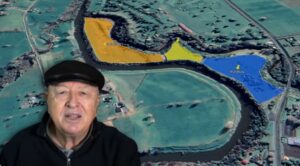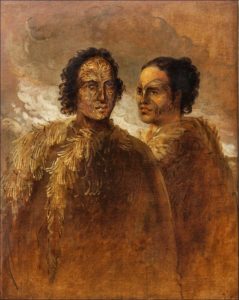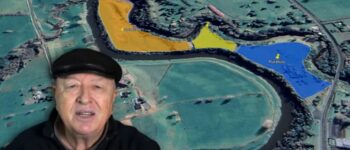1822: Siege of Matakitaki
May 4, 2024
By AHNZ

This month in New Zealand history, May 1822, The Siege of Matakitaki. Chief Hongi Hika of Ngapuhi tribe led an invasion force of 3,000 upon the Waikato Tribe led by chief (and future Maori King) Te Wherowhero. Both sides were very martially intelligent and organised but Hongi was rich in arms. The Waikato had just 10 guns.
Massive efforts were expended by New Zealanders to kill each other at Matakitaki. It was not a civil war but an international war. The nations, or tribes, were never one ‘Maori’ people nor would they be until New Zealand was politically annexed by the George Gipps of New South Wales in 1840.
Westerners looked on appalled as northern Maoris invaded Waikato, treading over the ruins of the prior conquest in Auckland to do it. Ref. 1821: Musket Wars Auckland, AHNZ
Hongi Hika was a man of the world. His empire was plugged into international trade including the fleets of American, French, and British whalers that frequented his ports. He knew Sydney and had his own pet family of Christian Missionaries in the Kendalls. Most recently Hika had visited England for 5 months and returned with gifts and cash to complete a huge arms deal on cut-price Brown Bes flintlock muskets that were surplus to the recently concluded Napoleonic Wars. While in England, Hongi Hika was introduced as the King of New Zealand (Ref. Wiki.) Having personally met King George IV he now knew what the top of the world’s superpower Christian hierarchy was and its hold on him was broken. No more strings. Hongi came home to New Zealand with something nobody else ever had and surely the opposite effect of what his man, Thomas Kendall, had intended from the trip. The strings were cut. Hongi was not humbled by the London Supercity or Royalty or English Christian piety but emboldened by the discovery these were people. Only people, just like himself. Now he came back as a big fish to a little pond with his new ego and lots of guns to back it up.
Hika now set out on his campaign against the Waikato. Deliberate, systematic and savage campaigns to wipe out a people, language, a culture. But it’s nothing the invaded Waikato people had not done or would not gladly do again themselves. There’s no just war here. Ref. 1832: Siege of Otaka, AHNZ
Thomson (1859) wrote that Siege of Matakitaki was a victory through surprise which probably reflects the understanding of the first Colonials. However, historians Percy Smith, Russell Stone, and Harvey Blunt show that both nations, defender and aggressor, were well aware of what they were involved with.
“Panics occasionally led to victory. Many of Hongi’s successes were produced by this cause, the most remarkable being the fall of Matakitaki on the Waipa river…Hongi’s army ate three hundred persons after the capture of Totara, on the river Thames..” – Ref. The Story of New Zealand, A.S. Thomson (1859)
“The Waikato who fled from this pa went to Taupo, Kawhia, and Mokau; but they came back…the Waikato people did not fear, but rushed upon the Ngapuhi and conquered them. The Ngapuhi fled and were pursued…down the Wakato, and, passing across the mouth of that river, they went on..By the time the fleeing Nga-puhi had gained their canoes a hundred of them had been killed…Waikato went back to their home, and, perhaps on account of fear, Ngapuhi never came back to make war on the Waikato people.” – The Ancient History of the Maori, John White (1888,) NZETC
“It is evident that the Waikato people expected and dreaded this visit from Nga-Puhi, for—it is said—the whole of the tribes which come under that name had assembled at Matakitaki, a very large pa situated at the junction of the Manga-piko stream with the Waipa river, and about a mile and a-half north of the present township of Alexandra or Pirongia, as it is now called, besides a great many of the Ngati-Mania-poto tribe…native accounts say that they numbered ten thousand people in the pa. No doubt this number is exaggerated, but as most of the people from Manukau and Waikato were there the pa must have been very populous.” – Maori Wars of the Nineteenth Century, Percy Smith (1910)
“A delay of two months in crossing this portage meant that great numbers of people in flight had time to seek refuge in Matakitaki, the extensive triple pa where Waikato had chosen to make their stand, under their great war leader Te Wherowhero (later known as Potatau),” – From Tamaki-Makau-Rau to Auckland, Russell Stone (2001)
“The pa resembles a factory. Groups are working on sections of the palisade. Crews lifting the logs from the rivers into the Matakitaki section and prepared, dragging lanes kept open, whares are dismantled and moved as required. The ovens are in continuous operation. New arrivals are assigned to the nearest kin. The tool makers are flat out. The apparent chaos is well organised.” – Episode 44: Mātakitaki – Part 1, ‘It Begins’. Kiwi Codger, Youtube (2021)
 Despite a brave defense, Matakitaki is overwhelmed and hundreds crush each other to death in the stampede to flee. According to Kiwi Codger’s coverage 7,000 Waikato flee into a diaspora with winter coming on. Matakitaki became a prison for captured slaves and Te Wherowhero’s warrior band recover some initiative with an ambush at Huiputea. Ref. Episode 48: Mātakitaki-Part 5 ; Cast into the Wilderness, Kiwi Codger, Youtube (2021)
Despite a brave defense, Matakitaki is overwhelmed and hundreds crush each other to death in the stampede to flee. According to Kiwi Codger’s coverage 7,000 Waikato flee into a diaspora with winter coming on. Matakitaki became a prison for captured slaves and Te Wherowhero’s warrior band recover some initiative with an ambush at Huiputea. Ref. Episode 48: Mātakitaki-Part 5 ; Cast into the Wilderness, Kiwi Codger, Youtube (2021)
By the end of June Hongi Hika’s forces have returned home to the Bay of Islands. It is notable that they cover their tracks by blocking the rivers behind them least the homeless Waikato warriors hunt them down. According to John White (1888) and Russell Stone (2001) that is just what they did and right away. “Waikato warriors had successfully harried their marauding Nga Puhi pursuers, isolating and killing a considerable number of them. This rearguard action chastened Hongi,…persuading him that it might be wiser after all to seek peace.” wrote Stone.
It’s somewhat strange that Hongi did not push his advantage to totally annihilate the enemy nation while he had the initiative. Perhaps he hadn’t seen enough Charles Bronson or Liam Neeson movies to know what happens in Act 2. Te Wherowhero had (or at least was versed in the Waikato equivalent) and what he also had was a very particular set of skills, skills he had acquired over a very long career. Skills that make me a nightmare for people like Hongi.
Te Wherowhero, future Maori King 1.0, rebuilt his kingdom to achieve musket parity with the Northerners by the early 1830s. This was done by energetic trading with Sydney from the Waikato’s ports at Kawhia and Waikato heads. Ref. Stone (2001)
As immediately as n February 1823 the two nations were putting all the slaughter, rape, infanticide, insult, and pillaging behind them! A great peace gathering at the Bay of Islands welcomed the Waikato chiefs, made long speeches, ate lots of food, and returned captive slaves. A pledge of peace and permanent friendship was struck and sealed by the marriage of Te Wherowhero’s brother to a Ngapuhi noblewoman named Matire Toha. Hongi sent the new royal couple to Takapuna then up the Waitemata to Riverhead, then Manukau, then up the Waikato, feasting broadcasting the new peace all the way. And, cleansing the old warpath and re-framing it as a river road of reconciliation.
Evidently Maoris of the day had some sophisticated culture to be able to make peace like that as well as they could make war. Folks in the Middle East could learn a lot.
2 thoughts on "1822: Siege of Matakitaki"
Leave a Reply
 Like Comment Share
Like Comment Share






Really enjoying your Musket wars series, I’m learning a lot about my Tainui and Ngati Toa ancestors of Kawhia. Do you have a contact for the Maketu Kaumatua. I’m looking at confirming my whakapapa. I believe I’m Ngati Ngahia. My ancestor is Te Rangiina whom married pakeha trader Ashley Laurie aka “Tamete Smith”
Many thanks
Murray Kelly
Hamilton
I don’t but it shouldn’t be difficult information to find. Best of luck